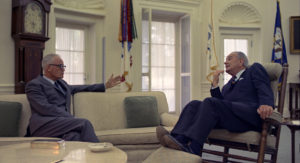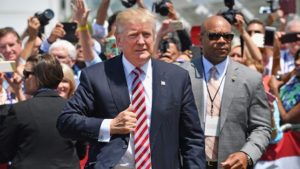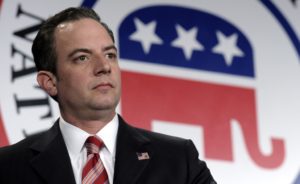Donald J. Trump and Hillary Rodham Clinton are engaging in a most extraordinary political fire fight.
Republican presidential nominee Trump and Democratic nominee Clinton are accusing each other of racial bigotry.
Race is an issue in this campaign? It must be so.
It also was an issue back in 1964. The major-party candidates then, though, took a different course.
President Lyndon Johnson and his Republican Party challenger, Sen. Barry Goldwater of Arizona, decided to keep race out of the campaign.
http://www.politico.com/magazine/story/2016/08/goldwater-lbj-racism-campaign-trump-bigotry-214191
The two men met at the White House in July 1964 and agreed that they wouldn’t interject the highly charged issue of race relations into their quest for the White House.
Sen. Goldwater was never known to curb his own tongue. He was a fiery conservative who was prone to making provocative statements. He opposed the Voting Rights Act and the Civil Rights Act.
President Johnson, the Texan known for his excesses and his occasional crudeness, had taken office amid profound national tragedy the previous November. He decided it was time to move his party away from its segregationist past, a decision that would cost the party dearly throughout the South.
As Politico reports:
“In 2016, many observers have suggested similarities between Trump and Senator Goldwater. In some ways, they are analogous: Both were outsiders who won the nomination of a deeply divided Republican Party after defeating the preferred, more moderate candidates of the GOP establishment. And Goldwater, like Trump, had a habit of impolitic comments, as in his clarion call that ‘extremism in the defense of liberty is no vice.’ It was a central part of Goldwater’s appeal: He tells it like it is, political correctness be damned—’In your heart, you know he’s right,’ just like his campaign slogan said.
“But there’s a big difference between the quixotic campaign of Goldwater and the spectacularly flawed campaign of Trump: Goldwater abhorred racist rhetoric, whereas Trump may have sealed his fate with it in two major turning points. First came Trump’s assertion that U.S. District Judge Gonzalo Curiel could not fairly rule in the Trump University case because the Indiana-born Curiel is of Mexican ancestry while Trump has pledged to build a wall on the Mexican border. Then, Trump’s attack on Ghazala and Khizr Khan, the Muslim-American Gold Star parents who appeared at the Democratic National Convention. Trump insinuated that Ghazala Khan, who stood silently by as her husband spoke, was ‘not allowed’ to speak due to their Islamic religion.”
It’s not that we should sweep the race issue away, pretend it doesn’t exist. My concern in 2016 is that the invective has poisoned reasonable, rational and responsible discussion.
President Johnson and Sen. Goldwater perhaps had the same fear 52 years ago when they decided to keep their hands off a live political grenade.









